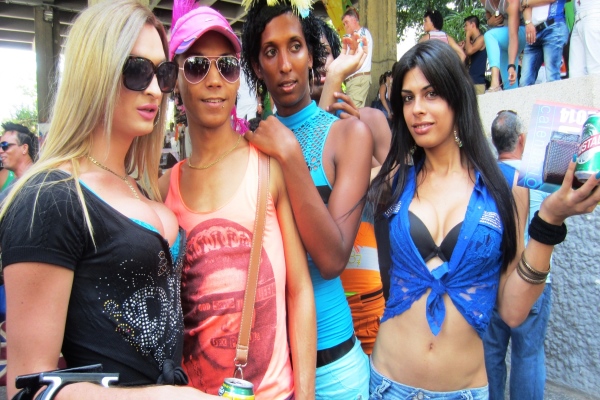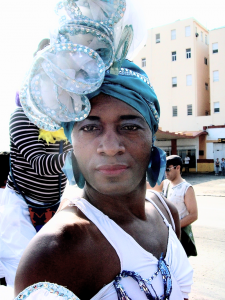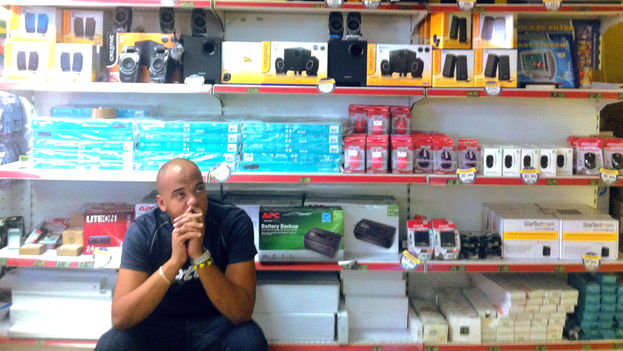
The drag queens warm up Havana with the steam of their bodies. Prostitution has been their lifesaver.
HAVANA, Cuba – Lolita, Alejandra, Samantha, Paloma, and África María are drag queens who stamp their feet on every Havana street corner during the night, while the city sleeps. Some with warrior faces and others as shy princesses patrol the streets and avenues of a broken Havana.
Lady Gaga is not the icon for them anymore. She has been replaced by Conchita Wurst, the “bearded Austrian” who won the Eurovision Festival. They don’t believe in political surgery or the “factory of genders” that the National Center of Sexual Education (CENESEX) proposes, after converting Adela, a transsexual from Caibarién, into the first delegate of Popular Power.
In the stories of these drag queens we find dysfunctional homes, school drop- outs, sexual violation by a relative, and above all, humiliation and rejection since childhood for being different.
As they consider themselves to be in the wrong body, they have transformed it with accessories, paper-mache tits, hormones, or surgery. The will to live has allowed some of them to work in hospitals, as hairdressers, or by singing in small clubs. For others, prostitution has been their lifesaver. continue reading
Africa Maria is an athletic “Negro” of 27 years. Her corn-blonde wig contrasts with her dark skin. With her spike heels and fleshy lips painted red, she goes out every night, from the male chauvinist district of Los Sitios in Central Havana up to the slums of Vedado. Her theater of operation is 23rd Street. Africa tells us, “We have displaced the hookers from the streets. They don’t consider us true women, because the men who look for us know very well who we are. They come in search of a repressed fantasy.
And she adds, “I came out of the closet when I was 17. I didn’t finish sports school since my father, an awesome solider with medals, who was ascending the ranks, kicked me out into the street. And since then I have not stopped selling my skin. And I’m proud, because in Cuba, to be black, gay, and a transvestite, you have to have big balls.”
 Samantha, who considers herself one of the most sought-after transvestites of homoerotic Havana, agrees.
Samantha, who considers herself one of the most sought-after transvestites of homoerotic Havana, agrees.
“We render a service, we relieve our clients’ tensions. And no one imagines the dangers we face. Cubans have forgotten the fear of AIDS, that we can get infected. But that’s not our greatest fear. The worst is the macho abusers who abuse us. We walk with a pocket knife or a scissors to defend ourselves. Similarly, a tourist or the police can hurt us. We gamble with life. Although sometimes we experience the tenderness of a desperate Negro, who searches in us for the fantasy of enjoying a white women, a pleasure, sometimes unattainable, because of the racial prejudice in our society.”
Lolita, Alejandra, Samantha, Paloma and Africa Maria warm up Havana, with the steam of their bodies. Every day they look at the sea, at the hope of the arrival of a cruise ship full of sailors. They don’t give up. They are “women in battle dress,” who don’t fear the night.
madrazoluna44@gmail.com
Friday, May 30, 2014, Juan Antonio Madrazo Luna
Translated by: Alberto and Regina Anavy
1 June 2014

![]() 14ymedio, 24 April 2015 – Linksys, the American company that makes routers for home networks and small businesses, announced on Thursday that it is negotiating with the United States Department of State and other authorities to receive the necessary directions that would allow it to distribute wireless routers in Cuba. Its intention, as affirmed by the company through its vice president of product management, Mike Chen, is to help overcome financial and technological obstacles that currently prevent expanding Internet access in the country.
14ymedio, 24 April 2015 – Linksys, the American company that makes routers for home networks and small businesses, announced on Thursday that it is negotiating with the United States Department of State and other authorities to receive the necessary directions that would allow it to distribute wireless routers in Cuba. Its intention, as affirmed by the company through its vice president of product management, Mike Chen, is to help overcome financial and technological obstacles that currently prevent expanding Internet access in the country.

